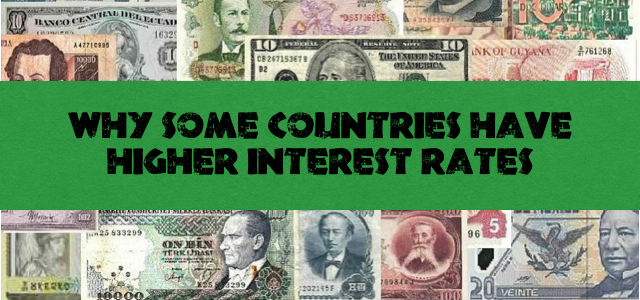
Countries With High Interest Rates
As the chart below indicates, some countries have very high bank interest rates. While money invested in a Canadian bank may only earn 1% interest, that same money could earn 12% interest in Nigeria. So, why don’t people invest all their money in foreign banks? This article briefly explains the answer to that question.
|
Country |
Interest Rate |
|
VENEZUELA |
15.7 |
|
IRAN |
15.0 |
|
ARGENTINA |
14.7 |
|
NIGERIA |
12.0 |
|
BRAZIL |
10.8 |
|
PAKISTAN |
10.0 |
|
TURKEY |
10.0 |
|
EGYPT |
8.3 |
|
INDIA |
8.0 |
|
INDONESIA |
7.5 |
|
RUSSIA |
7.0 |
|
CHINA |
6.0 |
|
IRAQ |
6.0 |
|
SOUTH AFRICA |
5.5 |
|
CHILE |
4.0 |
|
MEXICO |
3.5 |
|
PHILIPPINES |
3.5 |
|
COLOMBIA |
3.3 |
|
MALAYSIA |
3.0 |
|
AUSTRALIA |
2.5 |
|
POLAND |
2.5 |
|
SOUTH KOREA |
2.5 |
(Source: TradingEconomics.com)
Understanding Interest Rates
It’s important to understand banking interest rates. This excerpt from Wikipedia provides a helpful explanation.
The nominal interest rate is the amount, in percentage terms, of interest payable.
For example, suppose a household deposits $100 with a bank for 1 year and they receive interest of $10. At the end of the year their balance is $110. In this case, the nominal interest rate is 10% per annum.
The real interest rate, which measures the purchasing power of interest receipts, is calculated by adjusting the nominal rate charged to take inflation into account. (See real vs. nominal in economics.)
If inflation in the economy has been 10% in the year, then the $110 in the account at the end of the year buys the same amount as the $100 did a year ago. The real interest rate, in this case, is zero.
This is why it’s usually best to invest in local banks.
